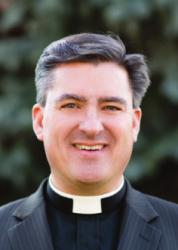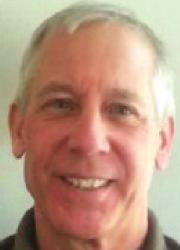A Local Pastor and a Local Atheist Debate Does Religion Solve the Mystery of Life After Death?
Sept. 23, 2016

Rev. Dr. William C. Myers
Senior Pastor at Presbyterian Church of Traverse City
"Remember, you are dust, and to dust you shall return." From the days of Adam, death has been a part of life. We didn’t give birth to ourselves. We cannot avoid "the debt all men pay." Our lives belong to God.
Theist or non-theist, every person fears death; those who don’t live in denial. We are hard-wired for self-preservation. Death is our mortal enemy. While the pain of life may become too great and death becomes a welcome friend, we will, yet, have lived striving to avoid death and died fearing we have nothing to show for it.
In The Denial of Death and Escape from Evil, Earnest Becker eloquently argues all we think and do, all our imaginative and creative works, our art and music, our philosophies and sciences, our monuments and industries, yes, even our religions, are futile and pitiful attempts to deny the inevitable. We cannot escape death.
Our denial of death is often seen most clearly at funerals. We fill the room with flowers and surround the body with statuary. We offer platitudes to those grieving. Why? The truth is too hard to bear. But flowers fade. Statuary becomes clutter. Platitudes fall flat. We are helpless in the face of death, but, if we have faith, we are not hopeless.
Facing death, people of faith are like anyone else. We weep. We mourn. We ache. We grieve. We become angry. We deny. We fear. What separates us from non-theists is we also trust. We trust that, even in death, God, to whom our life belongs, will turn our mourning to dancing. We have a peace that passes all understanding.
GARY’S RESPONSE
As Bill correctly points out, we all have a natural fear of death. That is completely understandable and we all must come to grips with the inevitability of that occurrence. Fabricating comforting solutions is fine for anyone who feels the need to convince themselves they won’t simply disappear.
As always with religious teaching, my problem is the continued propagation of these
fantasies by passing them to children without offering options. The religious seldom teach their kids that while they believe in life after death, many people throughout history have dismissed this concept, relied upon empirical evidence, and lived perfectly rich and full lives. Those people don’t dwell in fear of the unknown, but take comfort in reality. To me, that is the more peaceful outcome.

Gary Singer
Gary helps businesses with their Internet marketing. He was raised a Catholic.
How do you picture life after death? The only thing we have to base such a concept upon is what others have told us to believe. Dismissing the tales of those who have "died" and returned to tell us about the light and such, your image is as good as mine.
These thoughts have perplexed mankind since the evolution of our highly developed central nervous system, enabling us to make such considerations. Since the concept of our non-existence is naturally uncomfortable, it makes sense that ancient beliefs would fabricate life after death in one form or another.
In my estimation, the need for humans to comfort themselves with eternal existence is the primary driver of the continuation of religion. We are taught from early in life that certain beliefs will result in an afterlife of paradise, and that failure to believe so will bring eternal damnation. That’s powerful motivation to an immature mind.
At its core, virtually every religion allows us to pretend we will never die.
Though it might be uncomfortable to consider the possibility that when we die everything will be the same as it was before we were born, that really does seem to be the most plausible outcome.
Coming to grips with that notion makes it much easier to dismiss the scores of afterlife beliefs from more than 4,000 religions.
This is great news, when you think about it. No hell or purgatory-type punishments for all of those mortal and venial sins that Catholicism foisted upon me. On the other hand, no lounging around on clouds, hanging out with saints, dead friends, and relatives either. I prefer plausibility to wishful thinking.
BILL’S RESPONSE
Gary believes life ends in death. I don’t. But Gary offers no evidence other than personal belief. He dismisses documented accounts of those who have had a life after death experience. He ignores the scores of people who believe there is an afterlife. But even so, at the end of the day, we are still left with his question: How do you picture life after death? Or, better yet: "What do you believe about life after death?"
Gary mocks those who don’t share his beliefs"¦"no lounging around on clouds, hanging out with saints, dead friends, and relatives." I leave it to faith. Through the love of Jesus Christ, I trust God’s promise: "Nothing in life or death will ever separate us from God’s love."
Gary and Bill agree that until the day comes when we may discover for ourselves what awaits us beyond this life, each of us must answer the question of the afterlife for ourselves.
Trending

The Valleys and Hills of Doon Brae
Whether you’re a single-digit handicap or a duffer who doesn’t know a mashie from a niblick, there’s a n... Read More >>
The Garden Theater’s Green Energy Roof
In 2018, Garden Theater owners Rick and Jennie Schmitt and Blake and Marci Brooks looked into installing solar panels on t... Read More >>
Earth Day Up North
Happy Earth Day! If you want to celebrate our favorite planet, here are a few activities happening around the North. On Ap... Read More >>


